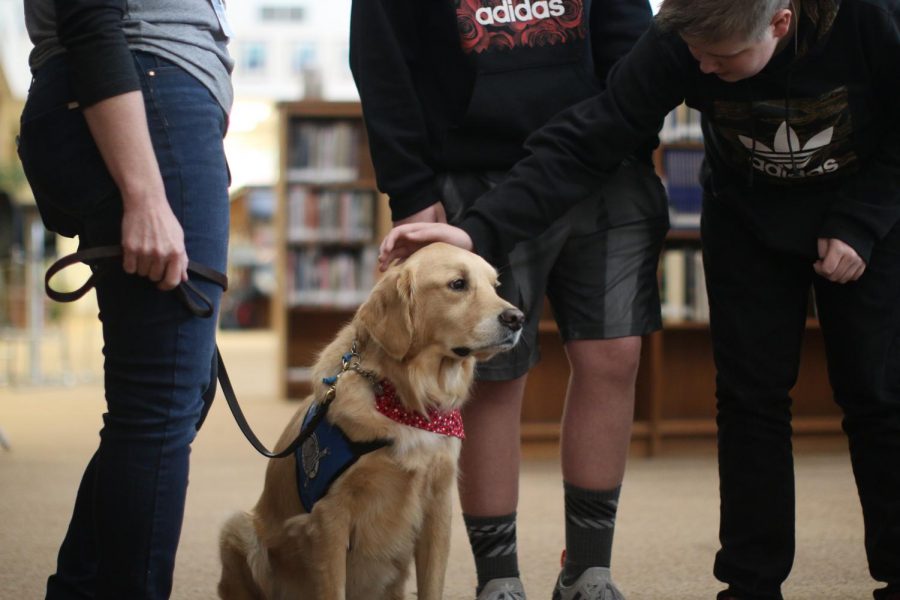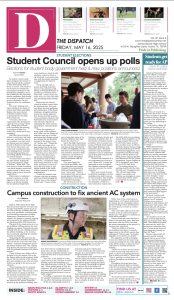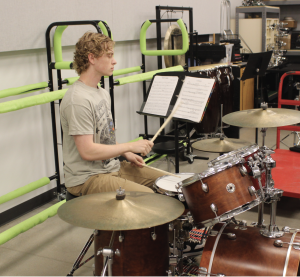Dogs aid ‘Dawgs with mental health
A DOG’S PURPOSE: Freshman Braden Kennedy pets Abner in the library during FIT on Friday. Abner provides emotional support for students while they study.
March 7, 2019
It’s around 7 a.m. on a Monday and the elementary schoolers have gathered around for morning assembly. A 5th grader is crying because she had a rough morning, so the teachers send her to the counselor’s office. Once she arrives, a tail-wagging Golden Retriever is there waiting for her hugs.
This is an example of one of the many jobs dogs perform, from being comfort animals to search and rescue dogs. At Bowie, service dog owner junior Anna Smiley has had her psychiatric service dog, Judge, for six months.
“He’s trained to pick up on my anxiety and nobody else’s,” Smiley said. “I actually scratch [my arms] when I get nervous…so [Judge] has learned that whenever he sees me do it to nudge my arm away and then he also does deep pressure therapy, so if I tap my chest he jumps up on me.”
According to the Americans with Disabilities Act, service animals are defined as being specifically trained to perform tasks for the benefit of an individual with a disability. In Smiley’s case, she has a psychiatric service dog prescribed by her psychiatrist, allowing her to take Judge along with her in any public place. Unlike emotional support animals (ESAs), which are often referred to as comfort animals, which are not allowed in public.
“I think if an individual is suffering from a major psychological disorder an emotional support animal can be beneficial,” Licensed Professional Counselor Savannah Stoute said. “Our pets are a source of unconditional love and the act of petting a dog can feel very calming. However, in order for a pet to be an emotional support animal, the student would have to go to therapy and a therapist or another mental health professional would have to agree and write a letter indicating that an ESA is necessary.”
Students with service animals also have to have a disability, which Assistant Principal Larry Britton explains is most easily identifiable by their qualification for a 504 or IEP (Individual Education Plan). Freshmen Ava Villalpando says that her IEP states she needs a service dog.
“I was evaluated by someone who worked for AISD and it was recommended that I get a service dog,” Villalpando said. “I got [my dog, Guts] off of Craig’s list for $500; we picked him up in a shaded parking lot of a barbecue in San Antonio.”
For students who don’t qualify for a service dog but could still benefit from the presence of a furry friend, the Lutheran Church Charities K-9 Comfort Dog Ministry works in partnership with Bowie to bring comfort dog, Abner, to see Bowie students free of charge.
“His other service is crisis and disaster, so for instance, if there’s been a violent situation somewhere and he’s requested, we will go and get volunteers to go with him,” caregiver Jill Gonzales said. “He’s gone to Houston when there was the hurricane, and he’s gone to places where there’s been tragedy of death.”
Abner has been visiting Bowie since late 2018. Students wishing to get more information on Abner may follow him on Instagram or Facebook as @lcck9abner. Abner is also available in the library during visits, which are usually once a month unless he receives an emergency call. Additionally, according to Stoute, any students feeling anxious, sad, or stressed and unsure if they’re experiencing a mental health issue should let a school counselor/parent know so they may contact a therapist if needed.
“It’s just nice to have a relationship with the students because we get called a lot when there’s been something bad happening at schools,” Gonzales said. “We just like to have a good foundation built with the students on a regular basis.”









